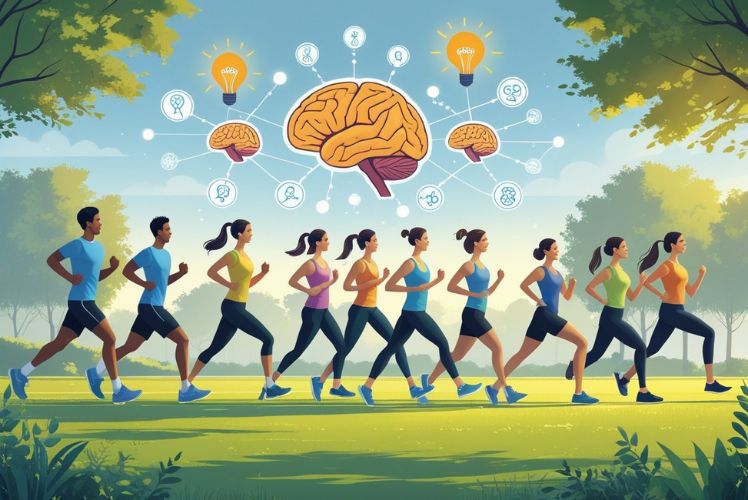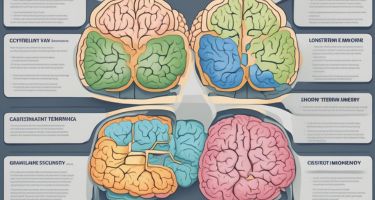Many of us want to keep our memory sharp, but with so many tips out there, it can be hard to know what really works. Simple daily habits like getting enough sleep, eating a balanced diet, staying active, and keeping our minds engaged can naturally help boost our memory. These habits not only improve how much we remember, but they also support brain health as we age.

From choosing foods that fuel our brains to making time for movement and mindfulness, every small change can make a difference. Easy lifestyle habits can benefit anyone looking to remember more and stay focused. Discover practical ways we can look after our memory and brain every day.
Key Takeaways
- Small daily habits can support memory and brain health.
- Quality sleep, good nutrition, movement, and mental challenges are key.
- Everyday choices matter for stronger memory and focus.
Prioritising Quality Sleep for Memory Retention

Good sleep is linked to better cognitive function and helps protect us from memory decline as we age. By focusing on sleep quality, we can improve both short-term memory and overall brain health.
Establishing a Consistent Sleep Schedule
A regular sleep schedule trains our bodies to fall asleep and wake up at the same times each day. This routine helps our internal clocks stay aligned, which makes it easier to fall asleep quickly and wake up feeling refreshed.
When our sleep times change often, our brains struggle to get the right balance of deep and light sleep. Over time, irregular sleep can reduce cognitive function and make it harder to remember new information.
To build a consistent schedule, we should aim for 7–9 hours of sleep each night, including weekends. Setting an evening routine, such as turning off screens and lowering lights an hour before bed, can signal to our brains that it is time to wind down. Drinking caffeine late in the day can interrupt our sleep, so it is wise to avoid it after mid-afternoon.
The Impact of Deep Sleep on Memory Consolidation
Deep sleep has a direct role in how our brains store and process new memories. During this stage, our brains organise the day’s information, moving facts and experiences from short-term to long-term memory.
If deep sleep is cut short, this process does not work as well. We may find ourselves forgetting new names, details, or what we learnt the day before. Sleep studies show that missing out on deep sleep over time can lead to greater memory decline and slower mental processing.
We enter deep sleep mostly in the first half of the night, so staying up too late can reduce its benefits. Ensuring that our bedroom is quiet, keeping a steady bedtime, and managing stress can all support longer periods of deep sleep.
Creating a Brain-Friendly Sleep Environment
Our bedroom environment strongly affects our ability to get quality sleep. A dark, cool room helps us fall asleep faster and increases our chances of staying asleep through the night. Using blackout curtains, setting a comfortable room temperature (around 18°C), and reducing noise all support healthy sleep.
Limiting screen time before bed is also key. The blue light from phones and tablets can make it harder for our brains to produce melatonin, the hormone that controls sleepiness. Instead of screens, we can read a book or listen to calming music to help us relax.
A tidy, calm space sends signals to our brains that it is time to rest. Small changes in our environment can make a big difference in sleep quality, which in turn helps keep our memory strong.
Fuel Your Brain with Nutrient-Rich Foods

The foods we eat play a major role in how well our brains work day to day. When we choose nutrient-rich foods, we support memory, focus, and slow down cognitive decline. Key nutrients from everyday foods help our brains stay healthy as we age.
Brain-Boosting Foods and Their Benefits
Certain foods stand out for their positive effects on brain health.
Fatty fish, like salmon, sardines, and mackerel, are rich in omega-3 fatty acids. These help keep our memory sharp.
Blueberries offer antioxidants that protect our brains from stress.
Walnuts are also a source of healthy fats and can help improve focus.
Dark chocolate gives us a small amount of caffeine and lots of antioxidants, which help fight damage to brain cells.
Leafy greens—like spinach, kale, and Swiss chard—contain vitamin K and folate. These support brain power and slow memory loss.
Here’s a quick summary:
| Food | Key Nutrient/Benefit |
|---|---|
| Fatty fish | Omega-3s for memory |
| Blueberries | Antioxidants for protection |
| Walnuts | Healthy fats for focus |
| Dark chocolate | Antioxidants & energy |
| Leafy greens | Vitamins for brain function |
Role of Omega-3 Fatty Acids in Cognitive Function
Omega-3 fatty acids are essential for our brain and are found mostly in oily fish, flaxseeds, and walnuts.
These fats help build brain cell membranes and support communication between brain cells. Regular intake of omega-3s, especially DHA (docosahexaenoic acid), has been linked to better memory, improved learning, and lower risk of cognitive decline as we age.
We see these results most clearly when we eat fatty fish, such as salmon, two or three times each week. Markedly, people who eat more omega-3s often do better on mental tasks and may slow down brain ageing. Including these foods in our meals can make a real difference.
Antioxidants for Protecting Brain Health
Antioxidants help to fight damage caused by free radicals in the brain. Free radicals are unstable molecules that can harm brain cells over time, leading to memory loss and cognitive decline.
Foods high in antioxidants include blueberries, dark chocolate, and vegetables like spinach and kale. Vitamins C and E are strong antioxidants, often found in colourful fruits and vegetables.
By adding these foods to our diets, we help protect our brains from stress and inflammation. Eating a mix of antioxidant-rich foods daily can support our mental sharpness and keep our brains working well.
Move More: Exercise for Enhanced Memory and Focus

Exercise is not only good for our bodies but also for our brains. Different forms of physical activity play a key role in sharpening memory, supporting focus, and aiding long-term brain health.
Aerobic Exercises and Blood Flow to the Brain
Aerobic exercises such as jogging, swimming, or cycling increase our heart rate and breathing. This rise in heart rate pumps more blood and oxygen to the brain. Adequate blood flow is important for delivering nutrients and removing waste products from brain cells.
Research shows that regular aerobic exercise can support the hippocampus, an area of the brain involved in memory. By keeping this part healthy, we may improve our ability to learn new things and remember information. Aerobic activities also encourage the release of brain-derived neurotrophic factor (BDNF), a protein that helps brain cells grow and form new connections.
For those just getting started, even moderate aerobic activity done consistently can make a noticeable difference. Aim for at least 150 minutes of moderate aerobic exercise each week. This can boost alertness as well as memory function over time.
Brisk Walking for Daily Cognitive Support
Brisk walking is one of the simplest and most accessible physical activities we can add to our daily routine. Walking at a faster pace raises our heart rate and improves circulation, which helps sharpen our thinking and memory.
Just 20 to 30 minutes of brisk walking a day can be enough to see benefits. Studies suggest that people who walk regularly perform better on memory and attention tasks than those who are mostly sedentary. Walking outdoors may also reduce stress, which can otherwise harm our ability to focus.
To get the most from brisk walking, keep up a pace where you can talk but not sing. Keeping this regular helps us maintain better cognitive performance as we age.
Physical Activity and Neuroplasticity
Physical activity goes beyond keeping our bodies fit; it also helps our brains adapt and grow through a process called neuroplasticity. Neuroplasticity is our brain’s ability to form new connections and reorganise itself in response to learning and experience.
Exercise, especially regular aerobic activity, increases the levels of key chemicals like BDNF. These chemicals play a big role in developing new neural pathways. When we move our bodies, we signal the brain to build fresh connections and strengthen existing ones.
Even short bursts of activity, such as taking the stairs or stretching, can support these processes. By making movement a regular habit, we help keep our brains adaptable and better equipped to manage everyday challenges.
Practising Mindfulness and Meditation

Mindfulness and meditation help us manage stress and sharpen our memory by improving our focus and awareness. By making these practices a regular part of our routine, we support our cognitive function, working memory, and overall mental health.
Guided Meditation Techniques
Guided meditation provides step-by-step directions from an instructor, either in person or through audio. It encourages us to focus our attention on the present moment, often by following the sound of a voice or listening to calming music. This focus helps reduce distractions and wandering thoughts.
We can choose from various types of guided meditation such as body scans, where we pay attention to different parts of the body, or visualisations, which create calming mental images. Many people find these methods helpful for improving concentration, lowering stress levels, and training the mind to become more aware.
By practising guided meditation for just 10 to 15 minutes daily, we may see improvements in memory and focus. Having a structure makes it easier to create a consistent routine and to stay on track.
The Effects of Deep Breathing on Concentration
Deep breathing is a simple technique we can use anywhere to support mindfulness and sharpen our concentration. By slowing our breath and taking full, controlled inhales and exhales, we trigger the body’s relaxation response. This process lowers stress and helps us clear our minds.
When we practise deep breathing, more oxygen reaches our brain, which can enhance cognitive function and mental clarity. Controlled breathing is often used during meditation to anchor attention, making it easier to ignore distractions.
To try it, we can breathe in deeply for four counts, hold for four, and exhale for four. Repeating this cycle several times calms our nervous system and can increase our focus when studying or working.
Using Meditation Apps for Consistency
Meditation apps like Headspace and Insight Timer give us easy access to guided meditations and breathing exercises. These apps can remind us to take breaks, track our progress, and offer themed sessions designed to improve memory, reduce anxiety, or promote mindfulness.
They often include short, beginner-friendly sessions, so we can fit mindfulness practice into our busy days. Audio and video guides help us maintain proper technique, and libraries of content keep the routine engaging.
Using an app supports consistency, making it more likely that we stick with meditation as a daily habit. Over time, this regular practice can boost working memory and improve our ability to concentrate.
Engaging Your Mind: Mental Stimulation and Challenge
Keeping our minds active through tasks like solving puzzles, reading daily, and learning new skills helps strengthen our memory and cognitive abilities. These habits build new neural connections and support our brain health over time.
Puzzles and Brain Games
Regularly tackling puzzles such as crosswords, Sudoku, and memory games helps sharpen our thinking skills. Brain training apps like Lumosity have become popular for their short daily exercises. These games target different parts of the brain, including memory, logic, and attention.
Doing such activities for just ten minutes a day stimulates mental activity. It encourages our brains to form and maintain new neural pathways, which is key for keeping our minds sharp as we age. We can also look for board games, word searches, or problem-solving riddles to add variety and keep these challenges engaging.
Sticking to new and varied games is important because it keeps us learning. Challenging ourselves in different ways leads to better long-term improvements in cognitive performance, rather than just getting faster at one specific game.
Benefits of Daily Reading
Reading is a simple yet effective way to keep our minds stimulated. Whether we read books, magazines, or articles online, the act of understanding new information exercises our brain. Reading every day expands our vocabulary, improves focus, and strengthens our ability to remember facts and details.
When we engage with stories or non-fiction, we must connect ideas, recall earlier points, and think critically about what we are reading. This mental effort builds stronger neural connections over time. Even short periods of reading offer valuable exercise for our minds.
A varied mix of genres and topics helps keep our interest and challenges us to think in new ways. Reading also reduces stress, which can further support our overall cognitive performance.
Learning New Skills for Neural Growth
Picking up a new skill, such as learning a language, playing a musical instrument, or cooking new recipes, encourages our brains to grow and adapt. This process, called neuroplasticity, helps form fresh neural connections.
We do not need to master a skill for it to be beneficial. The key lies in the process of struggling with new ideas and practising skills we have never tried before. This ongoing learning challenges our brain to work harder, which improves memory and mental flexibility.
Some examples include:
- Taking up painting or photography
- Learning basic coding
- Gardening with new plants
- Playing chess or similar strategy games
Setting small, achievable goals not only boosts confidence but also gives our minds regular stimulation and challenge, which is crucial for better memory and cognitive health.
Building Supportive Lifestyle Habits
Our memory often reflects how we care for our minds and bodies. Practical routines like connecting with others, expressing gratitude, keeping well-hydrated, and cutting back on multitasking can all sharpen our focus and support memory retention.
Social Interaction for Memory Protection
Staying connected with others does more than lift our spirits. Regular conversations and social activities stimulate brain areas tied to memory and attention. Through talking, listening, and sharing experiences, we actively use our working memory.
Isolation can lead to slower thinking and increased forgetfulness. Joining clubs, attending community events, or even calling friends helps keep our minds engaged. Simple social practices—like listening closely or recalling shared stories—also boost recall.
Positive relationships can lower stress and improve mental clarity. By building a strong social network, we reduce the risk of brain fog and cognitive decline. Even small moments of connection can make a lasting difference in our memory protection.
Journalling and Practising Gratitude
Writing in a journal encourages us to remember details about our day and reflect on our feelings. This practice helps strengthen memory pathways. Journalling can be as simple as jotting down events, thoughts, or goals each night.
Practising gratitude—listing things we appreciate—improves mood and focus. By actively recalling positive moments, we train our brains to notice and remember them in the future. The habit of gratitude can lower stress and reduce negative thinking, both of which affect memory.
Keeping a daily journal doesn’t take much time, but it encourages greater awareness and alertness. Over time, it becomes easier to recall details, manage forgetfulness, and remain mentally sharp.
Staying Hydrated for Optimal Brain Performance
Our brains rely on proper hydration to function at their best. Mild dehydration—even before we feel thirsty—can cause mental fatigue, difficulty concentrating, and increased forgetfulness. It is important to drink water throughout the day, not just with meals.
Signs of dehydration affecting brain function include headaches, trouble focusing, and brain fog. Drinking water or low-sugar drinks is usually enough. We should monitor our fluid intake and watch for symptoms of dehydration, especially during warmer weather or after exercise.
A simple tip is to keep a water bottle nearby as a reminder. Consistent hydration helps us maintain energy, attention, and clear thinking.
Reducing Multitasking to Prevent Brain Fog
Multitasking often feels productive, but it can actually harm memory and focus. Switching between tasks makes us prone to mistakes and reduces our ability to recall details later.
Focusing on a single task allows us to give our full attention and process information more deeply. This improves long-term retention and prevents brain fog caused by information overload. We can reduce multitasking by making short to-do lists and completing tasks one at a time.
If we need to juggle responsibilities, setting aside specific times for each job helps. By cutting back on multitasking, we create space for our minds to work more clearly and effectively.
Frequently Asked Questions
Daily choices like what we eat, how we study, and our physical activity play important roles in how well we remember things. Let’s look at practical ways to support memory, concentration, and overall brain health.
What dietary changes can enhance memory retention?
We should eat a balanced diet with foods rich in omega-3 fatty acids, such as salmon and walnuts. Including fruits, vegetables, and whole grains gives us antioxidants and vitamins that help protect brain cells.
Drinking enough water and avoiding too much sugar or processed foods also supports healthy brain function.
What are effective techniques to improve concentration and focus?
Breaking tasks into smaller steps helps keep our attention sharp. Using tools like to-do lists and schedules can reduce distractions and help us stay organised.
Mindfulness exercises, including deep breathing or short meditation sessions, can also improve our ability to focus.
How can students optimise their study routines to improve memory?
Creating a regular study schedule helps our brain remember information better. Spacing out study sessions over several days instead of cramming in one go is more effective.
Reviewing notes, explaining concepts out loud, and using flashcards can also reinforce memory.
What daily mental exercises can boost cognitive functions?
Solving puzzles, playing memory games, and reading regularly keeps our minds active. Learning new skills, such as playing a musical instrument or picking up a new language, stimulates different areas of the brain.
Writing or drawing can help us process and recall information better.
Are there specific lifestyle habits that contribute to brain health?
Getting enough sleep each night is one of the most important habits for memory and brain health. Managing stress through relaxation techniques supports better cognitive function.
Staying socially connected and keeping a consistent daily routine also benefit our brains.
How does physical exercise impact memory and brain function?
Regular physical activity increases blood flow to the brain, which can enhance memory and thinking skills. Even brisk walking or moderate exercise for 30 minutes most days of the week is helpful.
Exercise also reduces the risk of cognitive decline as we age and can lift our mood.





















